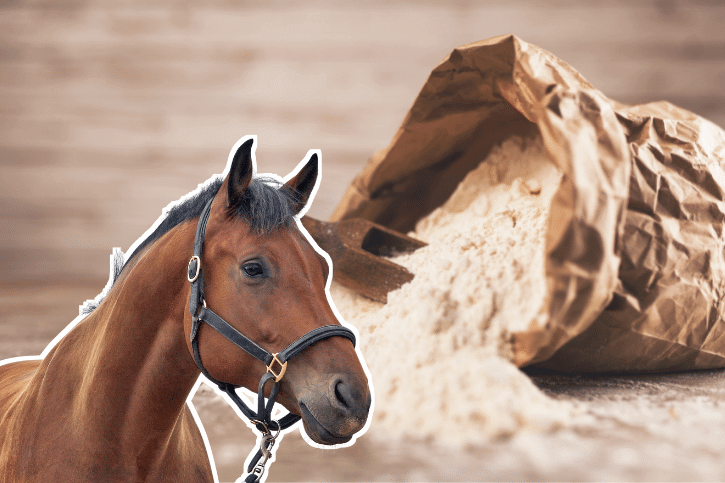Can Horses Eat Flour?
I love baking treats for the pets in my life.
I bake dog treats for all of my friends, but one of them has a horse and no dogs.
I was over at her house the other day, and I realized I haven’t baked her horse any treats before.
It got me thinking – can horses eat flour?
The answer is yes; horses can eat flour once in a while. However, because wheat flour is highly processed and low in fiber, and high in gluten, it is not advisable to use flour as a regular part of your horses’ diet.
I guess I shouldn’t make a giant batch of flour-based horse treats for my friend.
But I needed to know what it is about flour that’s dangerous for them?
Why is flour bad for horses?
Horses can generally handle most ingredients used in baking homemade treats.
However, flour lacks nutritional benefits for horses.
Flour is high in calories and carbohydrates but low in fiber, protein, or vitamins.
Store-bought treats made with flour should not be given to horses unless you purposely seek a brand designed for horses with all whole ingredients and minimal additives and preservatives.
Horses do not digest starch very efficiently.
Anything other than the smallest quantity of flour can take up valuable space in the stomach of your horse and prevent it from getting the nutrients it needs or, worse, be unable to handle the volume of food in its stomach.
Is there a type of flour that horses can eat?
Horses can eat flour that is not made of wheat, such as almond flour, coconut meal, and rice flour.
Such alternatives may be a good option if you would like to make baked treats for your horse.
If you wish to try a flour that is an alternative to wheat, choose a low starch, high fiber variety like the ones mentioned above.
Try to avoid corn flour and oat flour due to the high starch content.
There are several reasons to avoid feeding flour to your horse.
Flour can cause weight gain.
Weight gain is unlikely if you only give treats made with flour to your horse on rare occasions.
But if you are looking to make treats to give to your horse regularly, you are putting your horse at risk for weight gain.
Weight gain is harmful to horses in many ways.
It puts extra pressure on the joints, tendons, and ligaments, making it harder to get proper exercise.
Obesity can lead to heart and lung problems and may cause pain for your horse.
Weight gain can lead to insulin resistance.
Insulin is a hormone released by the pancreas in response to ingested carbohydrates.
When we feed too much sugar or flour to a horse, it will trigger the pancreas to make more and more insulin.
Imbalances in carbohydrates and insulin can lead to an inability for the horse to use the insulin it makes.
When the horse cannot use insulin, it cannot process the sugar leading to a buildup of sugar in the bloodstream.
When there is too much sugar in the bloodstream, the horse develops diabetes with can be life-threatening.
Not all obese horses will develop insulin resistance or diabetes.
Still, as good stewards of the health of our horses, we must do whatever we can to prevent these health issues before they start.
Flour can cause colic.
Well, many foods can cause colic in a horse, and flour is one.
Colic is the result of undigested starch that ferments in the colon.
The fermentation process produces lactic acid and a buildup of gas.
The extra lactic acid upsets the delicate pH balance in the gut.
We have all felt the pain of gas buildup, and it’s the same kind of discomfort for horses.
Undigested starch can stay in this fermentation vat for up to seven hours, and most of this time will be painful for your horse.
Horses have a delicate digestive system that, once disrupted, can be difficult to set right.
Disrupted pH can cause laminitis.
Laminitis is inflammation of soft tissues that attach the pedal bone to the hoof wall.
Too much sugar and starch leads to colic and laminitis.
The delicate pH is disrupted by the fermentation of undigested starch in the colon.
Laminitis is extremely painful and can even lead to the pedal bone separating and rotating within the hoof wall.
You may notice your horse lying down frequently to avoid pain or shifting weight off the affected limb.
How much flour is safe to eat?
If I did want to bake flour-based treats for my friend’s horse, how much would be safe for her horse to eat?
She shouldn’t feed her horse more than the equivalent of two standard slices of bread.
Even this may take a long time for the horse to digest, and there should be a long break between feeding flour-based treats again.
There are so many wonderful options for treating your horse that will not lead to health problems that there really isn’t any good reason to feed flour to your horse.
What alternatives can I use to make treats?
Luckily there are healthier options that can be used to bake treats for your horse.
Horses can eat oatmeal, bran, shredded carrots, applesauce, pumpkin, hay, grain, and more.
Many owners claim their horses love bran mash.
It doesn’t package up quite as nicely as a baked treat, but you can combine bran and your horse’s favorite fruits and vegetables for a treat he’ll love.
No responsible animal owner wants to feed toxic foods to their beloved pets.
Things that we think are harmless can cause a lot of health problems for some animals.
Luckily, we don’t have to worry about our horse getting into flour in the pasture or stable unless we put it there.
Even though flour isn’t immediately toxic to your horse, think hard about the potential consequences before adding flour into your horse’s diet.
